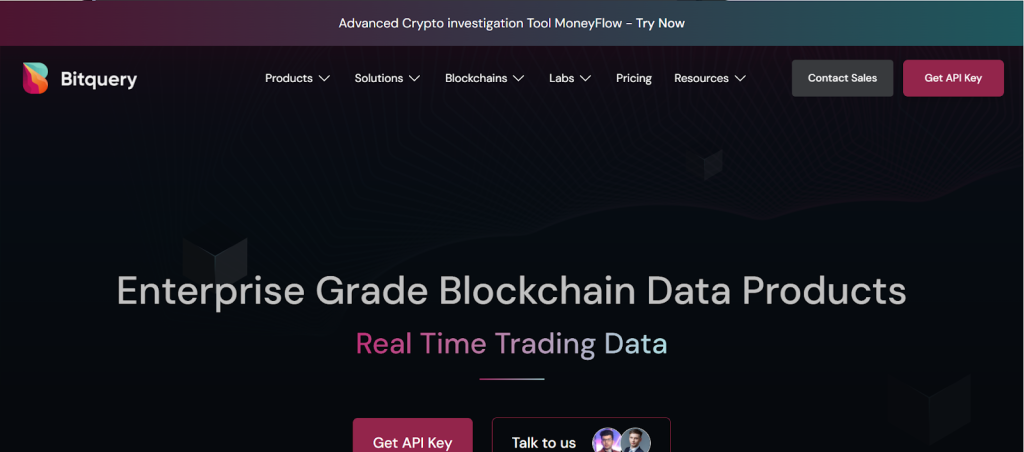For developers, traders, and analysts, having access to real-time blockchain data is very important. Access to transactions, smart contract interactions, and network activity encourages fast decision-making, smarter trading strategies, and more efficient dApp development.
In this article, we will focus on the top 3 APIs that developers, analysts, and traders can use to get real-time blockchain data streams for insights, automation, and decision-making.
Bitquery
Bitquery is a powerful blockchain data provider that provides APIs and tools for accessing and analyzing data across multiple blockchain networks, including Solana. It also offers comprehensive and real-time data, making it a top choice for traders and developers.
Bitquery provides real-time data across multiple blockchain networks, which allows for cross-chain visibility. They include;
Ethereum and EVM-compatible chains (BSC, Polygon, etc.)
- Solana
- Tron
- TON
- Layer 2 solutions
How does it provide real-time blockchain data streams?
1. GraphQL Subscriptions
Unlike regular queries that fetch data once, GraphQL subscriptions establish a persistent connection that pushes new data automatically when it becomes available.
2. Kafka Streams
Bitquery provides real-time blockchain data through Kafka streams as an alternative to WebSocket subscriptions. This solution is useful for algo traders, custodians who need low latency on-chain data to compete with similar services.
3. Comprehensive Data Points
Bitquery gives you access to rich, granular data in real time across multiple categories:
Real-Time DEX Trades
- Trade amounts, prices, and currencies
- Exchange-specific information
- Slippage and price impact data
- Trading pair analytics
Token Transfers
- ERC-20, BEP-20, and other token standard transfers
- Native currency transfers
- Transfer amounts and participants
- Historical and real-time balance changes
Smart Contract Calls
- Function signatures and arguments
- Gas usage metrics
- Call success/failure status
- Internal transactions within calls
Smart Contract Events
- Event names and emitted data
- Indexed and non-indexed parameters
- Contract-specific event filtering
- Event sequence tracking
Balance Updates
- Real-time wallet balance changes
- Token-specific balance monitoring
- Multiple address monitoring at scale
- Balance change notifications
These key features make Bitquery’s real-time data streams a comprehensive solution for blockchain data needs, allowing developers to build sophisticated applications that respond instantly to on-chain activities across multiple blockchain networks.
Alchemy


Alchemy is a development platform that provides infrastructure and tools for building decentralized applications (dApps) on various blockchains. It offers real-time trading data, smart contract interaction, and advanced analytics to power DeFi, NFT marketplaces, and trading platforms.
How does it provide real-time blockchain data streams:
Alchemy provides real-time blockchain data streams via tools and APIs that are designed to make data collection and monitoring easy for developers. Here’s how they do it:
1. Pipelines: Alchemy makes use of pipelines that allow developers to set up real-time data streams from blockchain networks to their preferred destinations. A data source (e.g., decoded logs) is configured as well as a destination (e.g., Postgres), and data flows through instantly. Pipelines come with the following features:
- Easy-to-use interface
- Fast historical backfills
- Real-time ingestion of incoming data
- Automatic re-org handling
- ABI decoding
2. Custom Webhooks: Alchemy offers Custom Webhooks to enable real-time blockchain event notifications, allowing developers to receive instant updates when specific on-chain activities occur for a set of wallets, events, and traces on a set of smart contracts. Custom Webhooks use GraphQL subscriptions to filter and push blockchain events to a specified HTTP endpoint (e.g., a cloud function or backend server).
3. WebSockets API: Alchemy also provides real-time blockchain data streams through its Websocket API. The WebSocket API provides a persistent, low-latency connection for streaming real-time blockchain data, which allows enabling developers to build responsive dApps without inefficient polling. It works by establishing a WebSocket connection to Alchemy’s high-performance Supernode infrastructure, where apps can subscribe to specific on-chain events like new blocks, pending transactions, or smart contract logs.
Chainlink


Chainlink is a decentralized oracle network that connects smart contracts with real-world data and external systems, allowing them to securely interact with off-chain information.
How does it provide real-time blockchain data streams:
Chainlink provides real-time blockchain data through its Data Streams solution. The Data Streams solution is a pull-based oracle system that delivers low-latency market data off-chain, which you can verify on-chain. This gives decentralized applications (dApps) on-demand access to high-frequency market data. Here’s a detailed breakdown of its architecture and functionality:
- Pull-Based Oracle Design: It uses a pull-based model where data is aggregated off-chain and made available for on-demand retrieval by smart contracts or dApps.
- Sub-Second Data and Commitnand Reveal: It supports sub-second data resolution for latency-sensitive use cases by retrieving data only when needed.
- Comprehensive market insights: Chainlink Data Streams offers price points such as mid prices and Liquidity-Weighted Bid and Ask (LWBA) for Crypto Streams. LWBA prices reflect current order book conditions, providing deeper insight into market liquidity and depth.
Conclusion
For developers, traders, and analysts, having access to real-time blockchain data is very important for informed decision-making, trading strategies, and dApp development. The APIs mentioned all stand out as top solutions, where each platform caters to distinct needs, ensuring reliable, real-time insights across DeFi, NFTs, and beyond.
Credit: Source link
